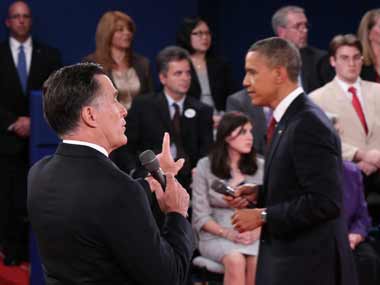Having just returned from a two-week visit to the United States, I can reliably inform you that there are two Americas. One is the America of people going to school, to work, loving and living life, complaining about the weather, enjoying the weather, laughing, praying, crying and shouting. It is no different than anywhere else by virtue of being full of humans. And the other America is the one of partisan divisions played out in blogs and the media. [caption id=“attachment_493245” align=“alignleft” width=“380”]
 Too close to call between the two presidential candidates? Reuters[/caption] You probably already know that blogs - even, yes, those of Firstpost-are not the same as “ordinary” people. The media is meant to pull together various opinions and perspectives and then reflect them back to the public for consideration. But in trying to understand US politics in these final weeks of the presidential campaign, those of us outside America are largely limited to media perspectives in how we understand what’s going on. A look at RealClearPolitics.com any day of the week will show largely the same headlines collected from the same sources. T_he New York Times, New Republic, Mother Jones_ will largely criticise Mitt Romney; Washington Times, Wall Street Journal, and Fox News will all criticise Barack Obama. You can identify some of the views down to individual columnists as well. You might find some everyday American voters who agree with these pieces, or parts of them. But generally these political blogs over-simplify inherently complicated individuals and communities. Even if individuals weren’t all distinct, their communities would be. The rest of the planet is rightly watching what will happen on voting day on 6 November. Romney or Obama will not be the president of billions of people, but the “leader of the free world” still matters. The next president will effect political stability, economic conditions, and positions on a host of subjects from health to the environment. Reading the blogs and media tea leaves about the battle for the White House is useful, but only in as far as they can reflect a hyper and shrill debate within the media itself, not individual households or minds. Reading the other stories of America, or even visiting the country in person, can offer a far greater, and more useful, perspective. Even using social media, such as Twitter, to connect to Americans watching debates or attack ads, will be more beneficial. It’s not a question of ignoring the media or blogs, but merely of reading and watching them with a healthy dose of skepticism. There is a country and world beyond digital words, and it is that “other” US nation - the one too complicated to fully “know” - that will decide the next presidency, not media pundits. That might make it harder to predict the future, but it is a more realistic, rational and calm way to sample tea leaves.
Too close to call between the two presidential candidates? Reuters[/caption] You probably already know that blogs - even, yes, those of Firstpost-are not the same as “ordinary” people. The media is meant to pull together various opinions and perspectives and then reflect them back to the public for consideration. But in trying to understand US politics in these final weeks of the presidential campaign, those of us outside America are largely limited to media perspectives in how we understand what’s going on. A look at RealClearPolitics.com any day of the week will show largely the same headlines collected from the same sources. T_he New York Times, New Republic, Mother Jones_ will largely criticise Mitt Romney; Washington Times, Wall Street Journal, and Fox News will all criticise Barack Obama. You can identify some of the views down to individual columnists as well. You might find some everyday American voters who agree with these pieces, or parts of them. But generally these political blogs over-simplify inherently complicated individuals and communities. Even if individuals weren’t all distinct, their communities would be. The rest of the planet is rightly watching what will happen on voting day on 6 November. Romney or Obama will not be the president of billions of people, but the “leader of the free world” still matters. The next president will effect political stability, economic conditions, and positions on a host of subjects from health to the environment. Reading the blogs and media tea leaves about the battle for the White House is useful, but only in as far as they can reflect a hyper and shrill debate within the media itself, not individual households or minds. Reading the other stories of America, or even visiting the country in person, can offer a far greater, and more useful, perspective. Even using social media, such as Twitter, to connect to Americans watching debates or attack ads, will be more beneficial. It’s not a question of ignoring the media or blogs, but merely of reading and watching them with a healthy dose of skepticism. There is a country and world beyond digital words, and it is that “other” US nation - the one too complicated to fully “know” - that will decide the next presidency, not media pundits. That might make it harder to predict the future, but it is a more realistic, rational and calm way to sample tea leaves.
Tristan Stewart-Robertson is a journalist based in Glasgow, Scotland. He writes for Firstpost on the media, internet and serves as an objective, moral compass from the outside.
)